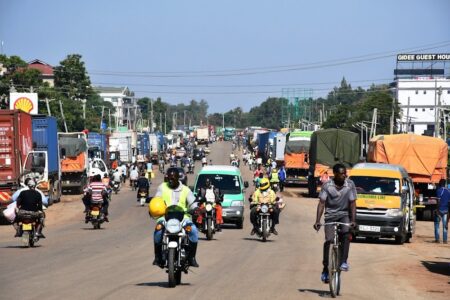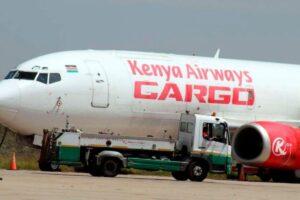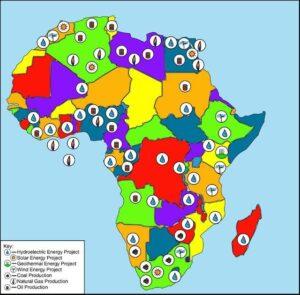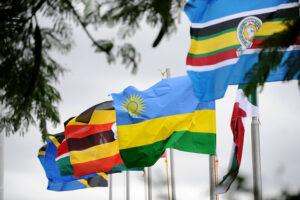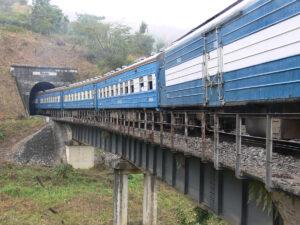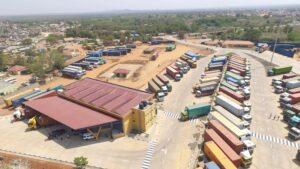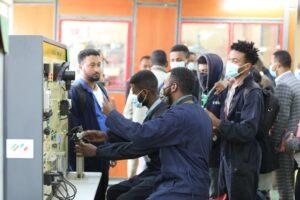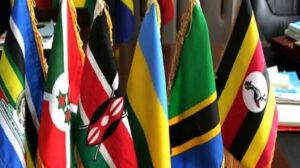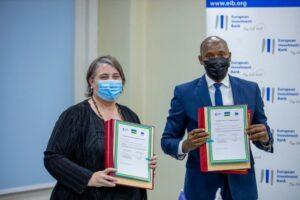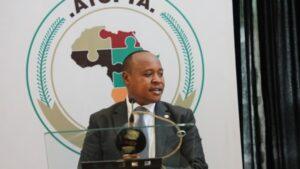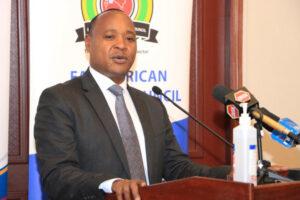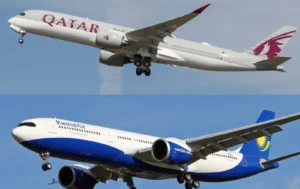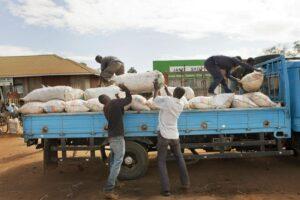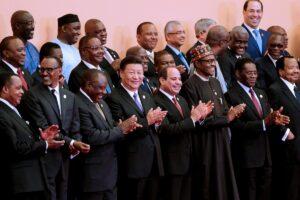- Africa’s new dawn: the rising role of digital and AI in agriculture
- Can Dangote Refinery Transform Africa Energy Ambition
- Gallup Survey: 80 per cent of Kenyan Workers Are Disengaged and Seek New Opportunities
- Madagascar Man Freed from 5KG Tumor After 15-Year Struggle
- How women in Africa are perceived and treated
- Sugar consumption in Kenya to Increase to 1.23 Million Tonnes
- Can Somalia and Turkey Oil deal Bring Change in Somaliland
- Remittances to Kenya dropped to $371.6 million in June, marking a six month low
East African Community
- Kenya’s President William Ruto says the free movement was necessary for sustainable growth in the Horn of Africa.
- Dr Ruto calls on member states in the region to eliminate national boundaries that are chocking growth.
- EAC Secretary General Peter Mathuki notes EAC can address challenges in advancing movement of goods and labour.
Barriers to free movement of goods and people are chocking East Africa’s regional integration. To unlock the bloc’s trade potential, Kenya’s President William Ruto is calling in the East African Community (EAC) and the Intergovernmental Authority on Development (IGAD) to remove barriers to free movement. Dr Ruto urges that free movement of people, goods and services can significantly enhance East Africa’s regional integration.
The Kenyan President notes the free flow of goods and capital was necessary for sustainable growth across East Africa.
The President is now challenging regional member states to eliminate national boundaries that have since become …
- Limited infrastructure, lack of standardized regulations and high air transport costs are among the challenges affecting the air transport sector in the East African Community according to a new report by East Africa Business Council.
- According to the report, limited liberalization of air transport contributes to high flight ticket rates and visa restrictions limit the movement of non-residents into the EAC region.
- The report calls for an EAC single air transport services agreement in a bid to lower the cost of air transport within the region.
Air Transport costs in the East African Community are higher than those in Europe and other African countries according to a new report by East Africa Business Council.
According to the report, the ticket price per kilometre in the EAC region is more than twice the ticket price for destinations in Europe and other countries in Africa.
‘‘The average ticket price per km in …
As Africa’s role in the global economy continues to garner prominence, it’s imperative for the continent to seal the gaping hole in its power supply.
Lack of universal power access remains a major roadblock that has retrogressed industrialization and socio-economic development. Statistics from the World Bank indicate that Africa remains the least electrified region in the world, with 568 million people lacking access to electricity.
The Bretton Woods institution, further notes that the Sub-Saharan Africa’s share of the global population without electricity, jumped to 77 per cent in 2020 from 71 per cent in 2018, whilst most regions saw declines in their share of access deficits. It has become a Hobson’s choice for African governments to prioritize the power sector, which is the epicenter of industrialization, working towards Goal 7 of the UN SDGs; which advocates for universal access to affordable, reliable and modern electricity services.
Currently, Africa’s power is …
South Sudan joined the East African community joined the EAC in April 2016, after being the youngest nation to gain independence on July 9, 2011. In 2020, South Sudan’s exports summed up to US$87 million to the EAC member states, while imports amounted to US$573 million.
In contrast to the year 2016, the exports and imports to the same stood at US$2.6 million and US$400 million respectively.
According to the International Trade Center, South Sudan exported US$86 million and imported US$357 million from Uganda in 2020.…
- Total students enrolled in the sixteen Regional Flagship TVET Institutes (RFTIs) increased from 6,971 students at baseline to 30,776 students at mid-term
- The project has surpassed its initial target to enrol 20,000 students annually in long-term and short-term training programs.
- According to the World Bank Enterprise Survey of 2015, over 25 per cent of firms surveyed in sub-Saharan Africa reported an inadequately educated workforce as a significant hindrance.
Education in Africa
Student enrolment in Technical and Vocational Education and Training (TVET) colleges in East Africa has quadrupled from the baseline data.
In February, the Inter-University Council of East Africa (IUCEA) released a mid-term evaluation report supported by the World Bank-funded East Africa Skills for Transformation Project (EASTRIP) in Mombasa, Kenya 1.
The report was carried out to evaluate the project’s performance in its mid-term. It revealed that the total students enrolled in the sixteen Regional Flagship TVET Institutes (RFTIs) …
- The East African economic growth is projected to recover this year despite COVID-19 setback thanks to sustained public spending on infrastructure and improved performance of the agricultural sector
- The bloc’s growth is likely to reach an average of 4.1 percent this year, up from 0.4 percent posted last year
The East African economic growth is projected to recover this year despite the COVID-19 setback thanks to sustained public spending on infrastructure and improved performance of the agricultural sector.
This is according to a new report by the African Development Bank’s (AfDB) which indicates that the bloc’s growth is likely to reach an average of 4.1 percent this year, up from 0.4 percent posted last year.
In its latest economic outlook report for the region, AfDB shows that next year average growth is projected to hit 4,9 percent.
Further, the report reveals that COVID-19 containment measures and global supply and demand …
- EIB has committed EUR 95 million to support companies that were most affected by the COVID-19 pandemic in Rwanda
- Bank of Kigali and KCB Bank Rwanda have been picked to manage the funds
The European Investment Bank has announced that it will support companies that were most affected by the COVID-19 pandemic in Rwanda, to a tune of EUR 95 million.
In a statement, the bank said it had picked Bank of Kigali (BK) and KCB Bank Rwanda to manage the funds, as well as provide new credit lines for Rwandan companies.
Commenting on the development, the Minister of Finance and Economic Planning Uzziel Ndagijimana welcomed EIB’s latest private sector engagement in Rwanda and the launch of its EUR 175 million East Africa COVID-19 Response Facility in the country.
Rwanda becomes the first country in East Africa to benefit from the new streamlined financing programme that will provide long term …
The AfCFTA is the largest trade agreement, by composition of countries enjoined, since the formation of the World Trade Organization. Currently, 54 out of the 55 African countries have signed the AfCFTA, with 41 having ratified it.
The agreement is set to ultimately open up the African market to trade freely, will boost intra-African trade and trigger structural transformation with the goal of reducing poverty.…
Private sector players in the region have expressed optimism in making steps towards the recovery of Covid-19.
This follows a commitment by the East African Community Secretariat to prioritize strengthening public-private sector partnerships between the private sector in the region and the EAC Partner States governments, to jointly invest in vaccine manufacturing in the region.
The EAC Secretary-General, Dr Peter Mathuki said that there was a need for a coordinated approach in handling COVID-19 in the region and emphasized the need for local production of vaccines.
“EAC is working on strengthening partnerships between the private sector and EAC Partner States’ governments, to jointly establish an investment in vaccine manufacturing, to ensure the region can produce and avail vaccines to East Africans. Truck drivers transporting goods across the region should also be included among the priority groups who need to be vaccinated,” Dr Mathuki said.
Mathuki also noted that the EAC …





